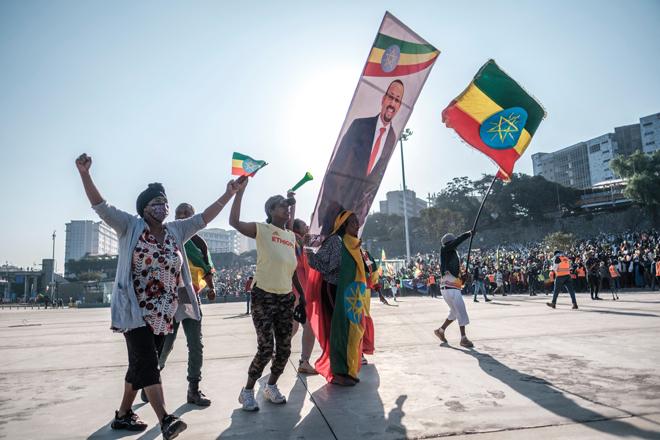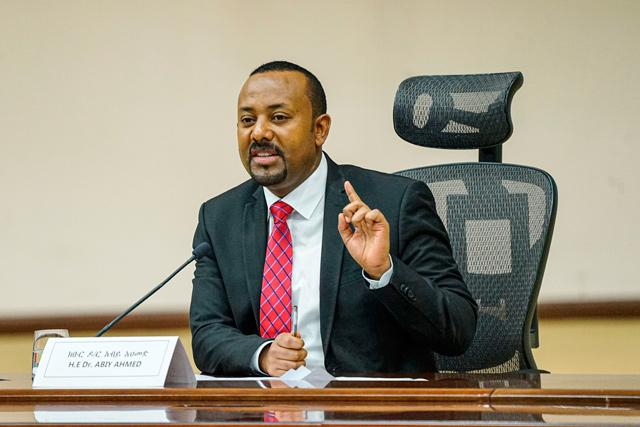You are here
UN says Ethiopia detains 72 World Food Programme drivers in war-hit north
By AFP - Nov 10,2021 - Last updated at Nov 10,2021

Demonstrators carry a banner with the portrait of the Prime Minister Abiy Ahmed during a rally in Addis Ababa, Ethiopia, on Sunday (AFP photo)
ADDIS ABABA — The United Nations said Wednesday that Ethiopia had detained 72 drivers working for the World Food Programme (WFP) in the country's conflict-torn north.
The news, which came a day after the UN reported the arrests of 22 employees in the capital Addis Ababa, is likely to further inflame tensions with the government following a decision in September to expel seven senior UN officials for "meddling" in the country's affairs.
A UN spokesperson said the latest detentions had occurred in the capital of Afar province, on the only functional road leading into famine-threatened Tigray.
"We confirm that 72 outsourced drivers contracted by WFP have been detained in Semera. We are liaising with the Government of Ethiopia to understand the reasons behind their detention," a UN spokesperson said.
"We are advocating with the government to ensure their safety and the full protection of their legal and human rights," the spokesperson added.
Officials last week announced a six-month nationwide emergency amid rising fears that fighters from the Tigray People's Liberation Front (TPLF) and Oromo Liberation Army (OLA) rebel groups could advance on the capital.
Lawyers say arbitrary detentions of ethnic Tigrayans, commonplace during the war, have surged since then, ensnaring thousands, with the new measures allowing the authorities to hold anyone suspected of supporting "terrorist groups" without a warrant.
Law enforcement officials describe such detentions as part of a legitimate crackdown on the TPLF and OLA.
UN spokesman Stephane Dujarric on Tuesday said that 22 Ethiopian staff had been detained in Addis Ababa. Six were freed while the remaining 16 were in custody Tuesday night, he added.
Information on the ethnicity of the drivers detained in Semera was not immediately available, though the UN has in the past hired ethnic Tigrayans to transport food and other aid into Tigray.
Famine fears
Prime Minister Abiy Ahmed sent troops into Tigray last November to topple the TPLF, a move he said came in response to rebel attacks on army camps.
Though the 2019 Nobel Peace laureate vowed a swift victory, by late June the TPLF had retaken most of the region including its capital Mekele.
Since then Tigray has been under what the UN describes as a de-facto humanitarian blockade.
Only 15 per cent of necessary aid has been able to cross from Semera into Tigray since mid-July, with hundreds of thousands of people living in famine-like conditions, according to UN estimates.
Foreign envoys are scrambling to end the war and mitigate further suffering, hoping that an African Union-led push can bring about a cessation of hostilities before a new surge in fighting.
The US said this week there was a “small window” to reach a deal, though it’s far from clear how major divisions will be bridged.
TPLF spokesman Getachew Reda appeared to dismiss peace initiatives on Wednesday, saying on Twitter that they seemed “mainly about saving #Abiy”.
Mass rape
The fighting has extracted a huge humanitarian toll, with rights groups on Wednesday issuing new reports on sexual violence in the war.
Human Rights Watch said the Abiy government’s “effective siege” of Tigray, where Ethiopian and Eritrean soldiers are accused of mass rapes — was preventing survivors from getting healthcare and other critical services.
Amnesty International said Tigrayan rebels had raped, robbed and beat up women during an attack on a town in Amhara region, south of Tigray.
The Ethiopian government has said it is committed to investigating acts of sexual violence and other abuses.
However the first federal official to speak out about the scourge, former women’s minister Filsan Abdullahi Ahmed, has run afoul of the authorities, with a police official on Tuesday announcing the closure of a private media outlet founded by her.
The official, Mohamud Sheikh Ahmed, accused Nabad TV of violating the state of emergency by broadcasting content that “incites violence and bloodshed”.
Filsan told AFP on Wednesday that her parents as well as Nabad staff had been detained overnight by police.
“Basically they are just intimidating people with this lawless state of emergency,” she said.
Filsan resigned from her position late September, saying: “Any situation that compromises my ethics is contrary to my convictions and values.”
Related Articles
ADDIS ABABA — Ethiopia said on Saturday that more than 150 aid trucks had entered war-torn Tigray over the past two days, after the United N
ADDIS ABABA — Ethiopia's capital Addis Ababa could fall within "months if not weeks", an Oromo group allied with Tigrayan rebels told AFP We
ADDIS ABABA — Ethiopian Prime Minister Abiy Ahmed said on Monday Tigray region's dissident leaders had fled west of the regional capital aft













